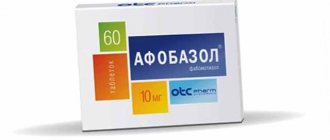Fluoxetine capsule
Fluoxetine (trade names - Fluoxetine Lannacher, Prozac) is prescribed for the treatment of depression of endogenous origin, obsessive-compulsive disorder. The drug eliminates tension and fear, relieves anxiety. Fluoxetine tablets or injections can cause side effects, and exceeding the recommended dose can cause severe poisoning.
Mechanism of action of the drug
The pharmacological action of the antidepressant Fluoxetine is based on the properties of its active ingredient. It selectively blocks the reuptake of serotonin in the central nervous system. Fluoxetine does not affect beta-adrenergic receptors, as well as receptors responsible for binding histamine.
The result of complex biochemical processes is:
- persistent increase in mood;
- blocking the development of various phobias;
- elimination of nervous tension, unreasonable fear, anxiety;
- stimulation of the body's energy potential;
- reduction in the severity of pain.
Unlike other antidepressants, Fluoxetine does not interfere with the functioning of the cardiovascular system. It is non-toxic and does not have a sedative effect.
Antidepressants do not solve the problem (suicide statistics after Prozac, global ban on Prozac)
The statistics of the disease are inexorable and show that about forty million people suffer from Prozac addiction in the world, while the mortality and suicide rates are higher than other drugs. There was a particularly large wave of indignation in Europe, America and Canada, where the drug was withdrawn from free access, it can only be obtained with a doctor’s prescription, and some countries even banned its use.
In Russia, the situation with Prozac is deplorable. Despite many deaths and an understandable predisposition to suicide, the pills were approved for free access and can be purchased at any pharmacy without a doctor's prescription. This has provoked an increase in the number of people addicted to antidepressants and is putting their lives at risk.
Indications for taking the medicine
The drug is effective for depressive disorders of varying severity, especially when combined with unmotivated fears. Doctors prescribe it for depression that is not accompanied by aggression and increased nervous excitability. Fluoxetine is used in the treatment of the following pathologies:
- schizophrenia;
- bipolar disorders;
- schizoaffective psychoses;
- obsessive-compulsive disorder;
- persistent headaches that cannot be relieved by analgesics;
- chronic alcoholism.
Another area of application for capsules is eating disorders. Fluoxetine is included in the therapeutic regimens of patients with kinorexia (ravenous hunger). This is a mental illness characterized by bouts of uncontrolled heavy food consumption and subsequent deliberate vomiting.
If a woman does not suffer from bulimia, then taking Fluoxetine makes no sense . The results of such “treatment” will be poisoning of the body and dangerous addiction.
Contraindications
An absolute contraindication to treatment is individual intolerance to the active or auxiliary ingredient included in the medicine. It is not prescribed during pregnancy and lactation, in childhood and adolescence.
It is prohibited to use Fluoxetine in the following pathological conditions:
- anorexia and predisposition to its development;
- severe renal and liver failure;
- epileptic seizures and convulsions;
- increased intraocular pressure;
- infection of the prostate gland;
- decreased muscle tone of the bladder.
The list of contraindications includes the tendency to commit suicide, which is characteristic of severe depression. Fluoxetine is not used together with MAO inhibitors - Iproniazid, Nialamide, Metralindole, Moclobemide.
Severe drowsiness may occur while taking the medicine. During this period, it is necessary to refrain from performing work that requires increased attention and concentration, and from driving a car.
Causes of fluoxetine overdose
Fluoxetine poisoning can be accidental or intentional. In the latter case, an overdose occurs due to the desire to feel euphoria - one of the side effects of the drug. For addicted people, auditory and visual hallucinations that appear when taking a large number of capsules are also attractive.
Causes of overdose include:
- non-compliance with the dosage regimen;
- long-term use of the drug;
- patient forgetfulness - use of capsules a short time after the previous dose;
- use with suicidal intentions;
- using expired capsules or tablets.
Taking Fluoxetine in the presence of contraindications is highly likely to lead to an overdose.
Are there any alternatives?
There are other medications to treat your condition.
Some may be better for you than others. Talk to your doctor about other drug options that may work for you. Disclaimer: Human-Health has made every effort to ensure that all information is factually correct, complete and up-to-date. However, this article should not be used as a substitute for the knowledge and experience of a licensed healthcare professional. You should always consult your doctor or other health care provider before taking any medications. The drug information contained herein is subject to change and is not intended to cover all possible uses, directions, precautions, warnings, drug interactions, allergic reactions, or side effects. The absence of warnings or other information about a particular drug does not mean that the drug or drug combination is safe, effective, or appropriate for all patients or for all specific uses.
Interaction of Fluoxetine with alcohol
A lethal dose of fluoxetine is considered to be 2.5 g of its active ingredient. When combining the drug with alcoholic beverages, this amount is reduced by almost 2 times. This means that death occurs when taking only 1.25 g of the drug. Under the influence of ethyl alcohol, the severity of overdose symptoms increases many times over. What happens 1-2 hours after administration:
- aggressiveness increases;
- one feels panic, fear, causeless anxiety;
- The patient is haunted by thoughts of suicide.
Due to impaired serotonin uptake under the influence of alcohol, mood decreases until the development of deep depression. In clinical practice, cases of partial memory loss have been reported.
Notes[ | ]
- ↑ 1 2 3 4 5 6 7 8 9 1011121314
Guide to the rational use of medicines (formulary) / Ed. A. G. Chuchalina, Yu. B. Belousova, R. U. Khabrieva, L. E. Ziganshina. — GEOTAR-Media. - M., 2006. - 768 p. — ISBN 5-9704-0220-6. - Kharkevich D. A.
Pharmacology. — 10th ed. - M.: GEOTAR-Media, 2010. - P. 642. - 908 p. — ISBN 978-5-9704-0850-6. - ↑ 1 2 Drobizhev M. Yu., Mukhin A. A.
Selective serotonin reuptake inhibitors: options for choice (comments on the works of Thase et al.) // Psychiatry and psychopharmacotherapy. - 2004. - T. 6, No. 1. - 'Generic Prozac' expected to be cleared for sale. CNN (1 August 2001). Retrieved December 27, 2012. (inaccessible link)
- ↑ 1 2
Top 200 Generic Drugs by Units in 2010 (English) (PDF).
Verispan
. Drug Topics. Archived from the original on December 15, 2012. - Patrisha Macnair.
BBC - Health: Prozac (English). BBC (September 2012). — “In 2011 over 43 million prescriptions for antidepressants were handed out in the UK and about 14 per cent (or nearly 6 million prescriptions) of these were for a drug called fluoxetine, better known as Prozac.” Archived from the original on February 9, 2013. - Ushkalova E. A., Ushkalova A. V.
Pharmacotherapy of depression in cardiac patients // Difficult patient. - 2006. - No. 1. Archived on May 22, 2013. - ↑ 1 2 3 Janiczak F. J., Davis J. M., Preskorn S. H., Ide F. J. Jr.
Principles and practice of psychopharmacotherapy. - 3rd. - M., 1999. - 728 p. — ISBN 966-521-031-9. - Thase, M.E.;
Corya, S. A.; Osuntokun, O; Case, M; Henley, D. B.; Sanger, T.M.; Watson, S. B.; Dubé, S. A randomized, double-blind comparison of olanzapine/fluoxetine combination, olanzapine, and fluoxetine in treatment-resistant major depressive disorder // The Journal of Clinical Psychiatry (English) Russian. : journal. - 2007. - February (vol. 68, no. 2). - P. 224-236. - doi:10.4088/jcp.v68n0207. - PMID 17335320. - Grohol, J.
FDA Approves Symbyax for Treatment of Resistant Depression.
Psych Central Blog
. - ↑ 123456
Pharmacotherapy in neurology and psychiatry: [Trans. from English] / Ed. S. D. Enna and J. T. Coyle. - M.: Medical Information Agency LLC, 2007. - 800 p.: ill. With. — 4000 copies. — ISBN 5-89481-501-0. - ↑ 1 2 3 4 5 6 7 8 9 10 Gubsky Yu. I., Shapovalova V. A., Kutko I. I., Shapovalov V. V.
Medicines in psychopharmacology. - Kyiv - Kharkov: Health - Torsing, 1997. - 288 p. — 20,000 copies. — ISBN 5-311-00922-5, 966-7300-04-8. - ↑ 1 2 3 Mashkovsky M.D.
Medicines. — 16th ed., revised, corrected. and additional - Moscow: New Wave, 2012. - 1216 p. — 5000 copies. — ISBN 978-5-7864-0218-7. - Ushkalova A. V., Kostyukova E. G., Mosolov S. N.
Problems of diagnosis and treatment of bipolar depression: from evidence-based scientific research to clinical recommendations // Biological methods of treatment of mental disorders (evidence-based medicine - clinical practice) / Ed. S.N. Mosolova. - M.: Publishing house "Socio-political thought", 2012. - P. 529-553. — 1080 s. — 1000 copies. — ISBN 978-5-91579-075-8. - ↑ 12345
Puzhinsky, 1997. - ↑ 1 2 3 4 5 6 7 Podkorytov V. S., Chaika Yu. Yu.
Depression. Modern therapy. - Kharkov: Tornado, 2003. - 352 p. — ISBN 966-635-495-0. - ↑ 1 2
Information letter from TsEBLS on the safety of fluoxetine
(unspecified)
(inaccessible link). Retrieved December 24, 2014. Archived February 3, 2020. - Ener RA, Meglathery SB, Van Decker WA, Gallagher RM
Serotonin syndrome and other serotonergic disorders. (English) // Pain medicine (Malden, Mass.). - 2003. - Vol. 4, no. 1. - P. 63-74. - PMID 12873279. [] - Bolton, James M.;
Sareen, Jitender; Reiss, Jeffrey P. Genital Anaesthesia Persisting Six Years after Sertraline Discontinuation (English) // Journal of Sex & Marital Therapy (English) Russian. : journal. - 2006. - Vol. 32, no. 4. - P. 327-330. - doi:10.1080/00926230600666410. - PMID 16709553. - Csoka, Antonei;
Bahrick, Audrey; Mehtonen, Olli-Pekka. Persistent Sexual Dysfunction after Discontinuation of Selective Serotonin Reuptake Inhibitors (English) // Journal of Sexual Medicine (English) Russian. : journal. - 2007. - Vol. 5, no. 1. - P. 227-233. - doi:10.1111/j.1743-6109.2007.00630.x. - PMID 18173768. - Torre D, Falorni A.
Pharmacological causes of hyperprolactinemia // Ther Clin Risk Manag. - Oct 2007. - T. 3, No. 5. - P. 929-951. - Paroxetine (Paxil) and fluoxetine (Prozac) can cause fetal development disorders // Moscow Regional Psychiatric Newspaper. — January — February 2009 — No. 1 (45). Archived from the original on October 20, 2020.
- Black K., Shea C., Dursun S., Kutcher S.
Selective serotonin reuptake inhibitor discontinuation syndrome: proposed diagnostic criteria (English) // Journal of Psychiatry & Neuroscience (English) Russian. : journal. - Canadian Medical Association (English) Russian, 2000. - May (vol. 25, no. 3). - P. 255-261. - PMID 10863885. - Fluoxetine (undefined)
. Register of Medicines of Russia. - ↑ 1234
Interaction of drugs and the effectiveness of pharmacotherapy / L. V. Derimedved, I. M. Pertsev, E. V. Shuvanova, I. A. Zupanets, V. N. Khomenko; edited by prof. I. M. Pertseva. - Kharkov: Megapolis Publishing House, 2001. - 784 p. — 5000 copies. — ISBN 996-96421-0-X. - ↑ 1 2 Malin D.I.
Drug interactions of psychotropic drugs (Part II) // Psychiatry and psychopharmacotherapy. - 2000. - ↑ 1 2 3 Sirolo D., Shader R., Greenblatt D.
Chapter 16. Drug interactions of psychotropic drugs // Psychiatry / ed. Sheider R. (translated from English by M. V. Pashchenkova with the participation of D. Yu. Veltishchev; edited by N. N. Alipov). - Practice, 1998. - ISBN 5-89816-003-5. - ↑ 1 2 3 4 5 6 Minutko V.L.
Depression. - Moscow: GEOTAR-Media, 2006. - 320 p. — 2000 copies. — ISBN 5-9704-0205-2. - Bauer M., Pfennig A., Severus E., Wybrau P.S., J. Angst, Müller H.-U.
on behalf of and on behalf of the Working Group on Unipolar Depressive Disorders. Clinical guidelines of the World Federation of Societies of Biological Psychiatry for biological therapy of unipolar depressive disorders. Part 2: Acute and continued treatment of unipolar depressive disorders as of 2013 // Modern therapy of mental disorders. - 2020. - No. 1. - P. 31-48. - ↑ 1 2 3 4 Mosolov S.N., Kostyukova E.G., Serditov O.V.
Serotonin syndrome in the treatment of depression // International Journal of Medical Practice. - MediaSphere, 2000. - No. 8. Archived on October 4, 2013. - Schlienger RG, Shear NH.
Serotonin syndrome (English) // British Journal of Psychiatry. - Royal College of Psychiatrists (English) Russian, 1996. - Vol. 169 (suppl.31). - P. 15-20. Translation: Serotonin syndrome // Review of modern psychiatry. - 1998. - Issue. 1. - Antidepressant therapy and other treatments for depressive disorders: Report of the CINP Working Group based on a review of evidence / Editors T. Bagai, H. Grunze, N. Sartorius. The translation into Russian was prepared at the Moscow Research Institute of Psychiatry of the Russian Federal Healthcare Service under the editorship of V.N. Krasnova. - Moscow, 2008. - 216 p. Archived copy from March 4, 2020 on the Wayback Machine
- Drug Interactions: SSRIs (undefined)
. iHerb.Com. Archived March 15, 2012. - Arana J., Rosenbaum J.
Pharmacotherapy of mental disorders. Per. from English - M.: BINOM Publishing House, 2004. - 416 p. — ISBN 5-9518-0098-6. - Bykov Yu. V., Bekker R. A., Reznikov M. K.
Resistant depression. Practical guide. - Kyiv: Medkniga, 2013. - 400 p. — ISBN 978-966-1597-14-2. - Fisher AA, Davis MW
Serotonin Syndrome Caused by Selective Serotonin Reuptake-Inhibitors-Metoclopramide Interaction (English) // The Annals of Pharmacotherapy (English)Russian. : journal. — January 2002. — Vol. 36, no. 1. - P. 67-71. - PMID 11816261. - Combination of Antidepressant Medications From Treatment Initiation for Major Depressive Disorder: A Double-Blind Randomized Study (unspecified)
(inaccessible link). Retrieved January 23, 2020. Archived April 3, 2020. - Mosolov S. N.
Basics of psychopharmacotherapy. - Moscow: Vostok, 1996. - 288 p. - Chetley E.
Problem Drugs = Problem Drugs. — per. from English - Riga, Latvia: Landmark, 1998. - 352 p. — ISBN 9984-9066-2-0. - Leo J., Lacasse JR
The Media and the Chemical Imbalance Theory of Depression (English) // Society : journal. — 2008. — February (vol. 45, no. 1). - P. 35-45. - doi:10.1007/s12115-007-9047-3. - ↑ 1 2 3 4 5 Götsche P.
Deadly drugs and organized crime: How Big Pharma corrupted healthcare / [Trans. from English L. E. Ziganshina]. - Moscow: Publishing House "E", 2020. - 464 p. — (Evidence-based medicine). — 3000 copies. — ISBN 978-5-699-83580-5. - Eli Lilly & Co. — Drug Manufacturer's History, Products, Lawsuits (English). Drugwatch.com (November 2, 2015). Retrieved May 2, 2020.
- Angell M.[en].
The Epidemic of Mental Illness: Why?
(undefined)
. The New York Review of Books (January 23, 2011). Archived from the original on September 21, 2012. - Kirsch I., Deacon BJ, Huedo-Medina TB, Scoboria A., Moore TJ, Johnson BT
Initial Severity and Antidepressant Benefits: A Meta-Analysis of Data Submitted to the Food and Drug Administration // PLoS Medicine (English) .)Russian : journal. — 2008. — February (vol. 5, no. 2). - P. e45. - doi:10.1371/journal.pmed.0050045. - PMID 18303940. - Horder J., Matthews P., Waldmann R.
Placebo, Prozac and PLoS: significant lessons for psychopharmacology // Journal of Psychopharmacology (English) Russian. : journal. — 2010. — June (vol. 25, no. 10). - P. 1277-1288. - doi:10.1177/0269881110372544. - PMID 20571143.
Characteristic signs of overdose
Due to the characteristics of pharmacodynamics, symptoms of an overdose of Fluoxetine appear after approximately 3-4 hours. Unlike antipsychotics and tranquilizers, this drug does not cause drowsiness, but insomnia. The person is agitated, aggressive, psychologically and emotionally unstable. His mood changes dramatically.
As the active substance Fluoxetine is absorbed into the systemic circulation, other signs of overdose appear:
- a headache begins in the temples and back of the head;
- nausea appears, often ending in vomiting;
- fingers and toes tremble;
- blood pressure increases slightly;
- heart rate increases.
Trembling of the limbs is often replaced by convulsions. Sharp pain in the stomach, heartburn, and a feeling of lack of air when inhaling appear.
Important Warnings
FDA Warning: Suicidal Ideation and Actions During Fluoxetine Therapy
- This drug has a black box warning. This is the most serious warning yet from the Food and Drug Administration (FDA). A black box warning alerts doctors and patients to drug exposure that may be dangerous.
- Fluoxetine may increase the risk of suicidal thinking and behavior. This risk is especially high in children, adolescents and young adults. The risk is greater during the first few months of treatment with this drug. You are also at greater risk if you have a personal or family history of bipolar illness or suicidal thoughts or actions. Your doctor and your family should monitor you closely when you start taking this drug and during dosage changes. They should watch for changes in your behavior or signs of worsening depression.
Other warnings
- Serotonin syndrome warning: This drug may cause a life-threatening condition called serotonin syndrome. This syndrome occurs when medications cause too much serotonin to accumulate in the body. Symptoms may include agitation, hallucinations (seeing or hearing something that is not there), problems with coordination, and a rapid heartbeat. They may also include hyperactive reflexes, fever, nausea, vomiting, or diarrhea. If you have any signs of this condition, call your doctor immediately.
- Mania Warning: This drug may cause mania. Symptoms include a significant increase in energy, severe irritability, talking more or faster than usual, racing thoughts, or severe trouble sleeping.
- Low salt warning: This drug may cause dangerously low salt levels in your blood. Symptoms include headache, weakness, confusion, trouble concentrating, memory problems and feeling unsteady. If you have any symptoms of this condition, call your doctor immediately.
First aid for fluoxetine overdose
The first thing to do in case of an overdose of an antidepressant is to call an ambulance. Then it is necessary to alleviate the condition of the victim:
- rinse the stomach until clean water comes out;
- lay him down, try to calm him down, cover him with a warm blanket;
- give any enterosorbent - activated carbon, Polyphepan, Polysorb, Enterosgel;
- drink weak sweet tea.
If a person is unconscious, emptying the stomach is strictly prohibited. The victim should be turned on his side to prevent him from choking on the vomit. In case of clouding of consciousness, it is useful to sniff cotton wool moistened with a drop of ammonia.
When young children overdose on the antidepressant Fluoxetine, the risk of death increases. It is advisable for parents and their child to drive towards the ambulance.
Treatment
If overdose symptoms are severe, the victim will be hospitalized. His stomach is washed again and enterosorbents are given. Further therapeutic tactics depend on the leading signs of intoxication:
- the action of Fluoxetine is blocked by the serotonin receptor antagonist Cyproheptadine;
- the muscle relaxant Dantrolene is used to relieve seizures and tremors;
- the anticonvulsant drug Diazepam will simultaneously eliminate nervous excitability.
Taking Glycine will help normalize the functioning of the central nervous system . To improve overall health, vitamin and mineral complexes are included in treatment regimens.
Consequences of dosage violations
This antidepressant is characterized by a withdrawal syndrome. After stopping treatment, symptoms of depression may not only return, but their intensity increases significantly. Therefore, fluoxetine doses are reduced gradually. But some patients have already developed physical and psychological dependence.
The consequence of such addiction is taking the drug in higher doses. Sooner or later, chronic intoxication develops, disrupting the functioning of all vital systems of the body. The condition is dangerous and often leads to the development of serious illnesses.
Prevention
Storing the medication in places accessible to small children and people with mental disabilities can cause overdose and poisoning. All antidepressants must be kept in locked cabinets. It is imperative to monitor the expiration date of Fluoxetine. If the color of the capsules changes, they cannot be used for treatment.
Recently, overdose is increasingly being diagnosed due to inappropriate use of the drug. Girls and women who want to lose weight use Fluoxetine in excess. Doctors never tire of reminding: an antidepressant is intended for weight loss only for bulimia. Therefore, it is necessary to choose other ways to achieve a slim figure.
Diagnostics
A specific clinical picture and anamnesis help in establishing the cause of an overdose. Characteristic features:
- severe vomiting;
- dilated pupils;
- increasing convulsions;
- hyperreflexia.
Anamnesis:
- presence of depression;
- taking Fluoxetine for therapy;
- alcohol abuse.
Blood tests may show neutrophils with toxic granularity. There is an increased amount of protein in the urine.










